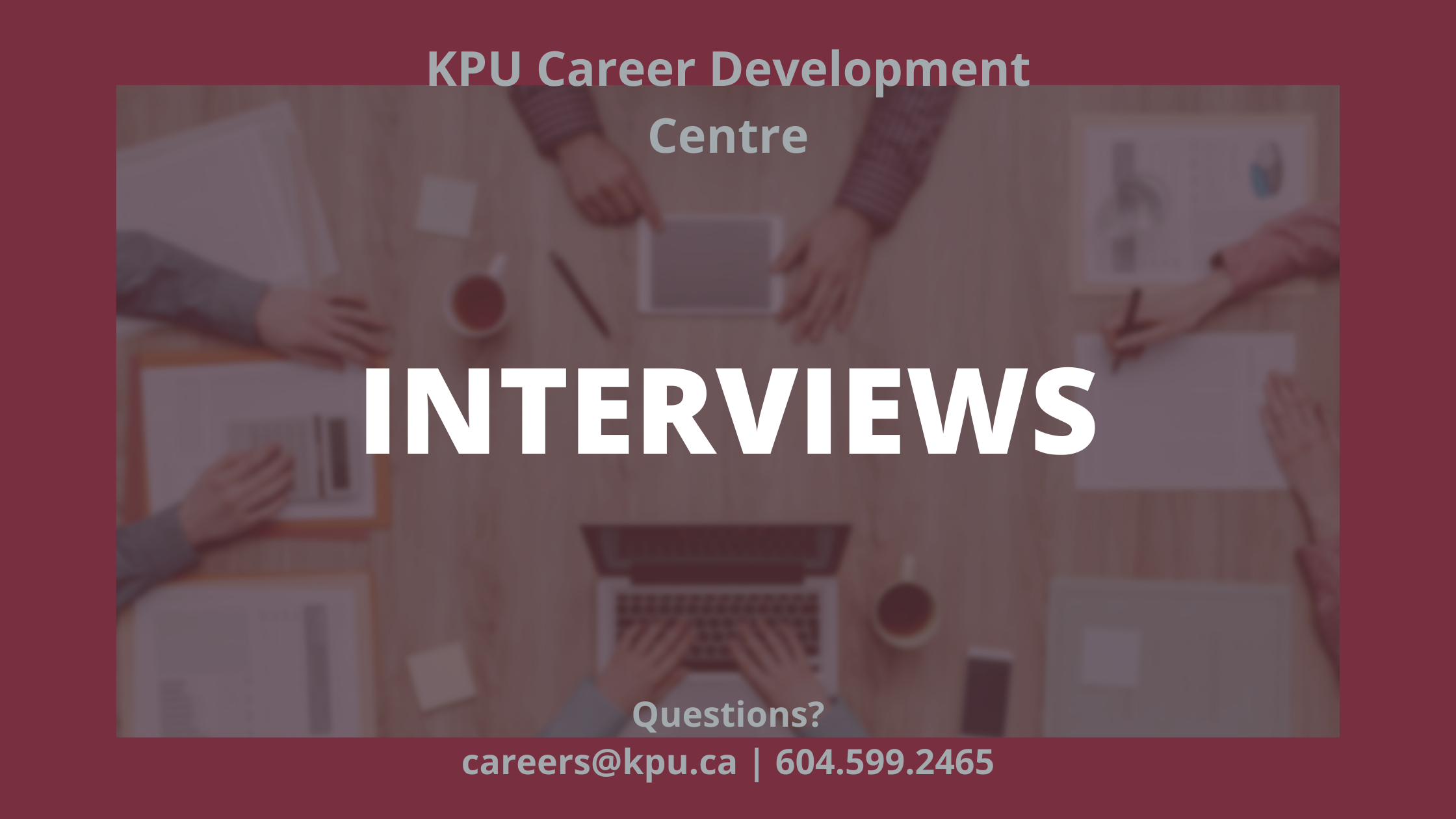Career Resources

What is an Interview?
Interviews provide applicants (you) an opportunity to verbally articulate your abilities (what you can do) and your soft skills (how you work and interact with colleagues, managers and clients)
Why is it important to prepare for an interview?
- Reduces anxiety so you are more confident and professional
- Gives you the opportunity to strategically communicate information that is relevant, concise and related directly to the question
- Impresses interviewer(s) with your ability to take initiative, convery knowledge and communicate effectively
STAGE 1: The Invite
When you get invited to the interview, here are some of the questions you may want to ask:
- Who will you be meeting with or who will be doing your interview – names (spelling) and titles
- What is the parking situation like? Where exactly is the office? (if it is in a building, ask what floor their office is or if there is a reception area)
- Who do you ask for when you arrive?
- What type of interview will be administered?
- Will any tests be administered? Which ones? Are there any presentations to prepare?
Before you get off the phone repeat the date, time and location of the interview
STAGE 2: Preparation
So few job seekers prepare for interview; those who do will “gain a real edge over others through preparation.” The secret to a successful interview is preparation.
- Practice answering interview questions with others or in front of a mirror
- Search for directions – know where you are going
- Know the position – analyze the job posting so you can answer the following questions:
- What is the employer looking for?
- How can you link your skills & experience directly to the employer?
- What are your skills & qualifications?
- What can you offer to an employer?
STAGE 3: Research
Employers may test your knowledge of the company, so research the employer, interviewer, and industry
- Company website – company size, growth, products & services, target market, locations, HR policies & procedures, news releases, latest accomplishments, annual reports and/or financials, mission/values/goals
- Google search and LinkedIn – the company and the interviewers names to gather some unbiased information
- Your network – people you know who work there or are a customer or a vendor
- Typical duties/responsibilities
- Salary range – industry standard
- Employer’s competitors – know who their competition is so you can use this information to your advantage during the interview
STAGE 4: The Day of the Interview
- Pay extra attention to your grooming and presentation and give yourself extra time to get to the interview for unexpected delays. If you are running late call the interviewer and explain why.
- Don’t arrive too early, 5 to 10 minutes early is ideal. This allows you time to relax before the interview and review your notes.
- If you are kept waiting, don’t appear too anxious. Smile and be friendly. Do not scroll through your phone and ensure it is on mute.
What to Bring:
- 2 copies of your resume
- List of 3 to 4 references
- A pen and note pad with questions to ask the interviewer
STAGE 5: During the Interview
- Be friendly to everyone
- Make observations
- Firm handshake – greet your interviewer enthusiastically, stand up and extend your hand for a medium-to-firm handshake, smile *Covid may have changed this custom. Be prepared for a friendly nod or elbow bump!
- Don’t sit down until you are invited to
- Think of the interview as a conversation, not an interrogation
- Be prepared for any type of interview
- Be attentive to body language and posture
- Follow the interviewers lead, stay on topic and ask for clarification if needed
- Don’t make negative comments about previous employers. Always emphasize the positive, including what you have learned from any challenging experiences.
- Wait for the employer to bring up the subject of wage, hours and vacation, etc. Negotiation typically happens after there is a job offer.
- Prepare questions to ask the employer. It demonstrates an interest in the position and company. An average of 3 questions is a good amount.
- State your appreciation for the interview. Ask if you can phone in a few days to check on the status of your application. If they offer to contact you, politely ask when you can expect their call.
For more information, log into Career Connection to download the Interview Toolkit
More on the topic! Log into Career Connection to read about the power of storytelling during interviews in Storytelling Tips for a STAR Interview and the art of Offer Negotiation!
Need Help?
The Career Development Centre offers students FREE Interview workshops and mock interview practice. Book a one-on-one appointment through Advisor Connect. You can sign up for workshops through Career Connection.